The beleaguered state of Christians in the Middle East
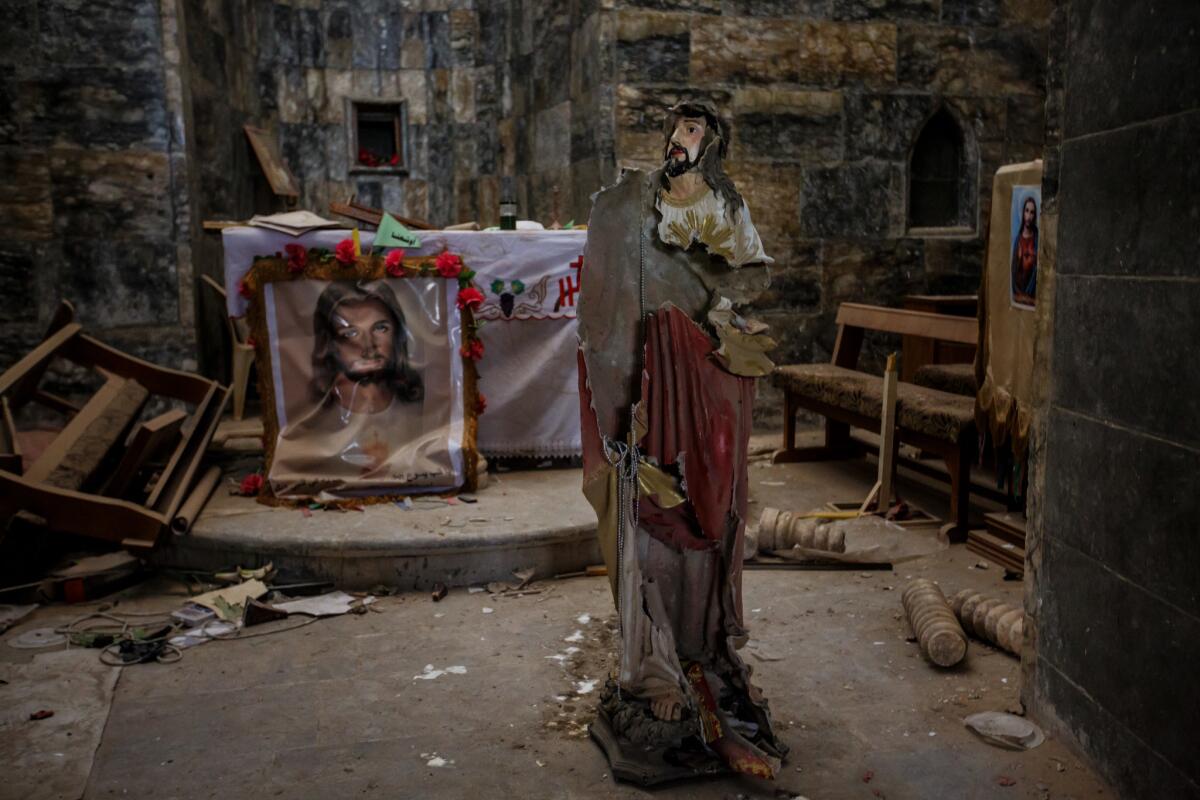
- Share via
Pope Francis boosted the spirits of Christians throughout the Middle East last week when he paid a two-day visit to Cairo, the first visit by a pontiff to Egypt in 17 years. But the pope’s visit did not change a harsh reality: Christians throughout the region find themselves under threat by political repression and violent attacks.
In Egypt, Coptic Christians have been chased from their homes, their churches and a monastery attacked. In Iraq, Assyrians have been displaced from villages, whole neighborhoods and business districts gutted by Islamic State. In the West Bank, Iran and Lebanon, Christians have grown accustomed to celebrating under guard.
“Some of the oldest Christian communities in the world are disappearing in the very lands where their faith was born and first took root,” concluded a Center for American Progress report on the plight of Christians in the Middle East.
The Middle East-North Africa area has the highest concentration of Muslims of any region of the world: 93% of its more than 340 million inhabitants.
Christians in the region face not only the threat of Islamist violence, but subtler challenges. Many wind up leaving because they can’t find jobs and face social discrimination. Countries such as Saudi Arabia make it difficult for Christians to practice their faiths openly.
We talked to Christians across the region, from Egypt to Iran.
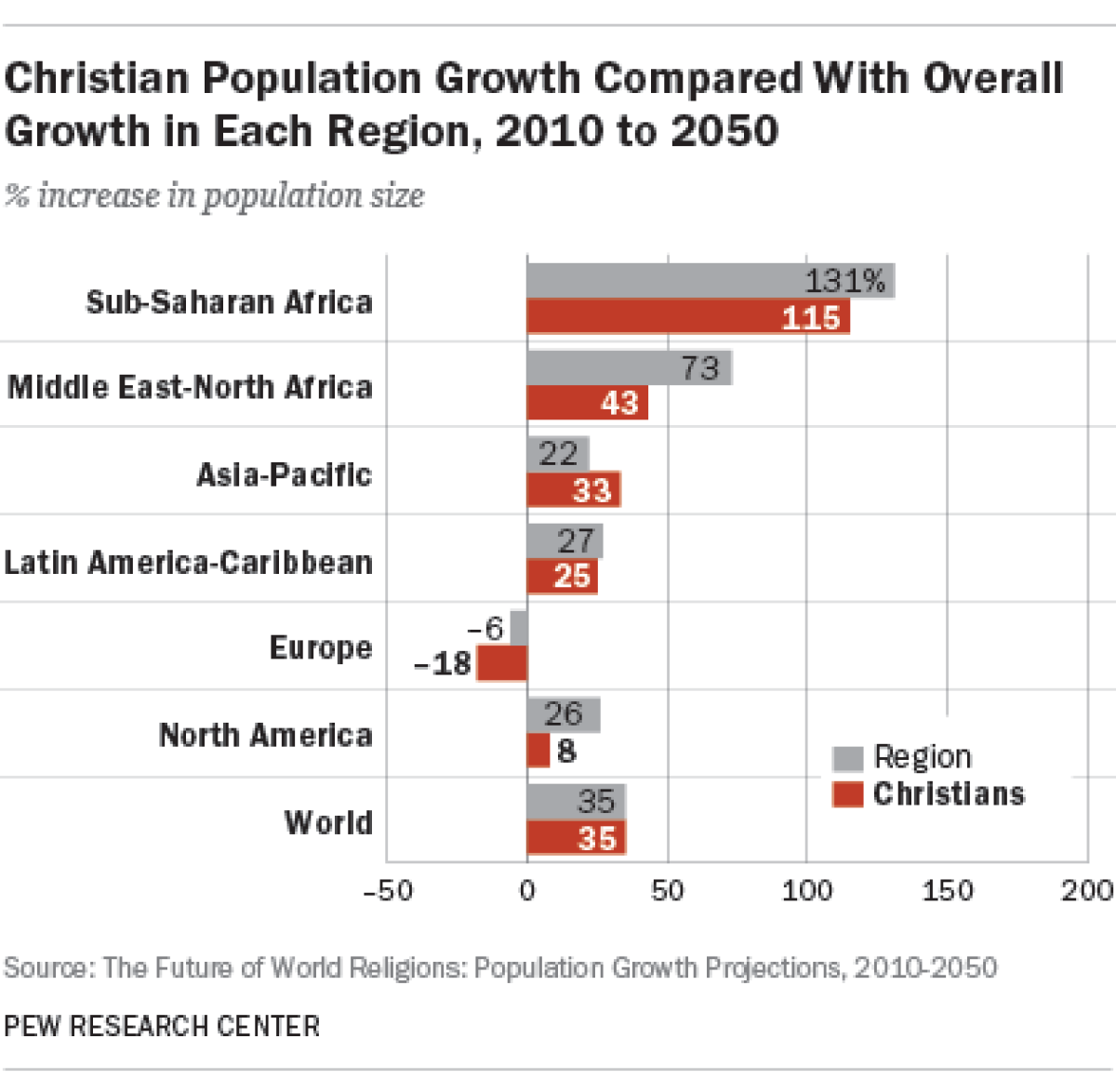
Facing Islamic State in Iraq
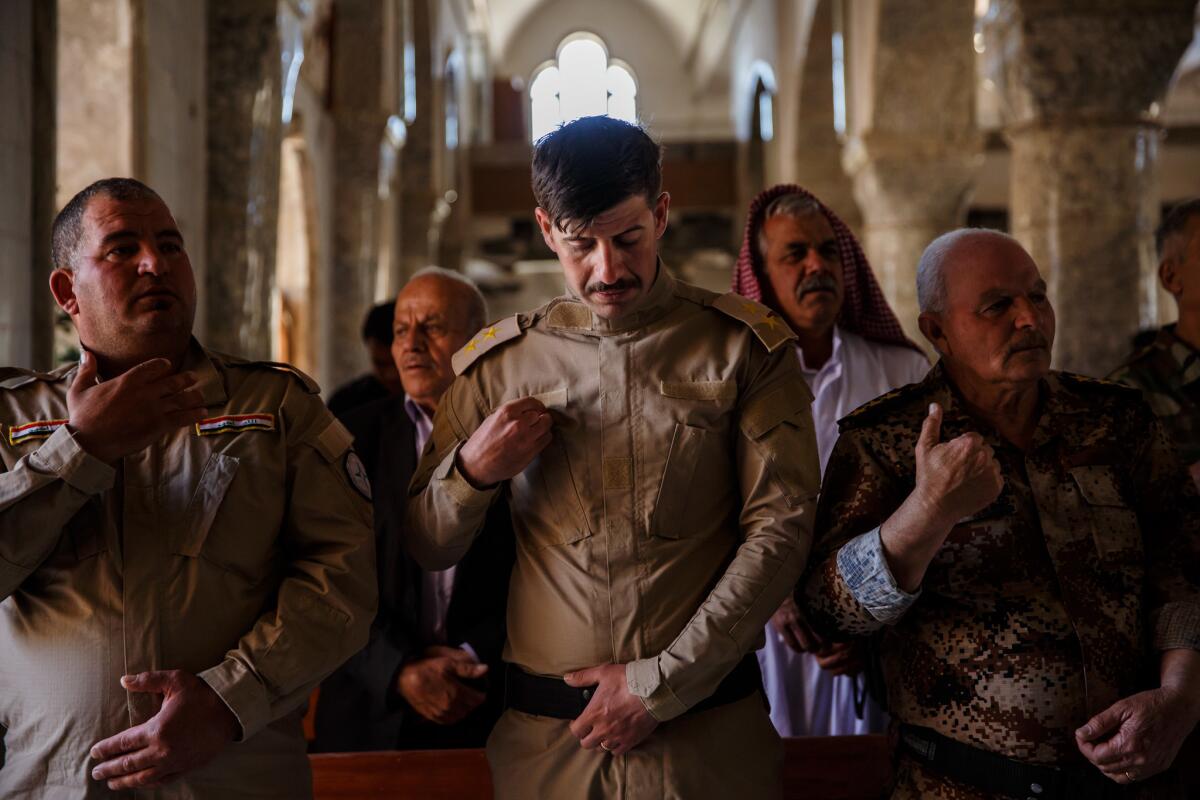
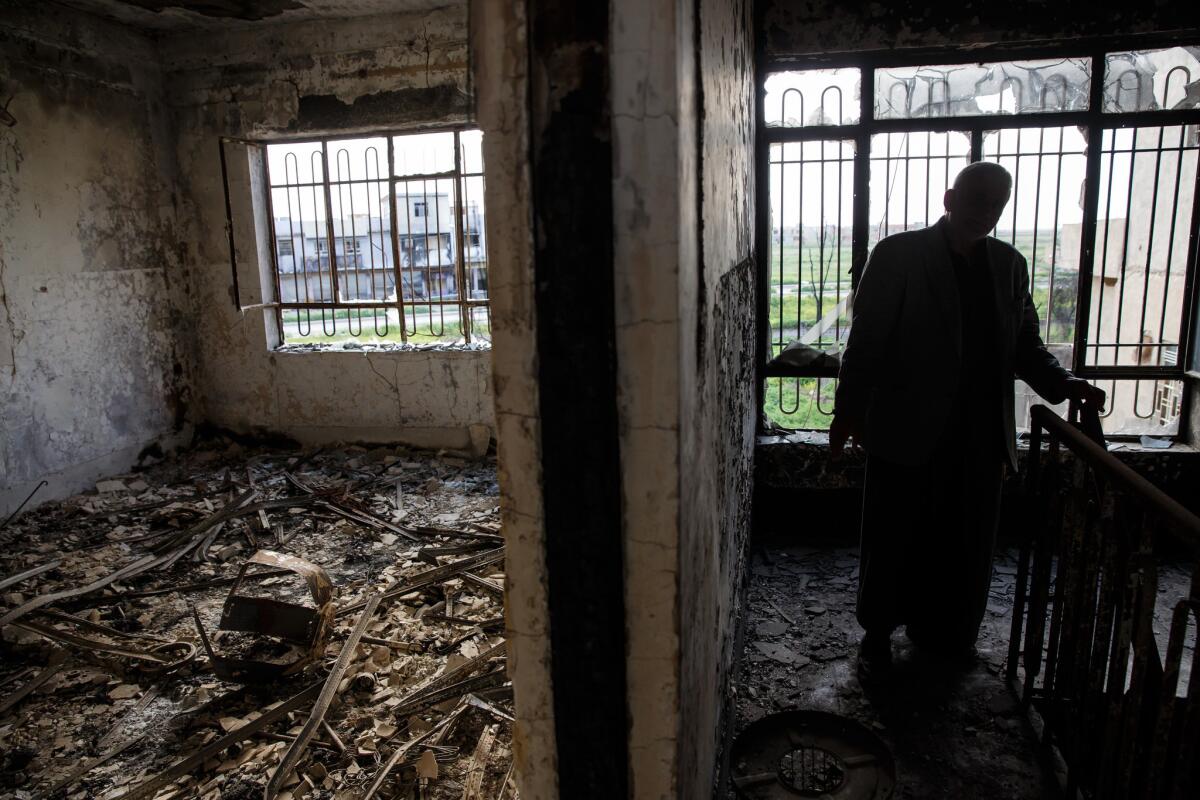
He once owned a house, a hotel, a casino, a herd of cattle and a farm in the Christian city of Qaraqosh east of Mosul, home to 50,000. Then Islamic State arrived.
Militants forced Tawfiq Abosh Jabu Sakar and most of his neighbors from their homes. They took his hundred head of cattle, his chicken coops, even his irrigation pipes. Then they burned his home and business.
“They want to make us all refugees,” said Sakar, 67, as he flipped through photos of his stolen cows.
Iraqi forces freed the area last fall, but many displaced families refused to return. The government had yet to restore running water and electricity. A Christian militia was patrolling the streets, but they feared militants still lurked nearby.
Two months ago, Sakar decided to move back.
“Christian people have a right to stay here,” he said. “Those who love the area will return and give their soul to protect it.”
He gets upset sometimes with the Iraqi government, and with international charities he thinks should help Christians resettle. Standing in the charred remains of his three-story home this month, Sakar picked up a piece of plaster and threw it at the cracked ceiling in frustration.
“You can’t use this house anymore. What did I do to deserve this?” he said.
Sakar has replaced his singed casino ceiling, and is repairing the hotel above. He is building a new ranch house near his fields, which he replanted with corn. So far, the crop appears healthy.
Islamic State “destroyed everything,” he said. “But I still have hope.”
Displaced in Iraq: ‘It’s getting worse’
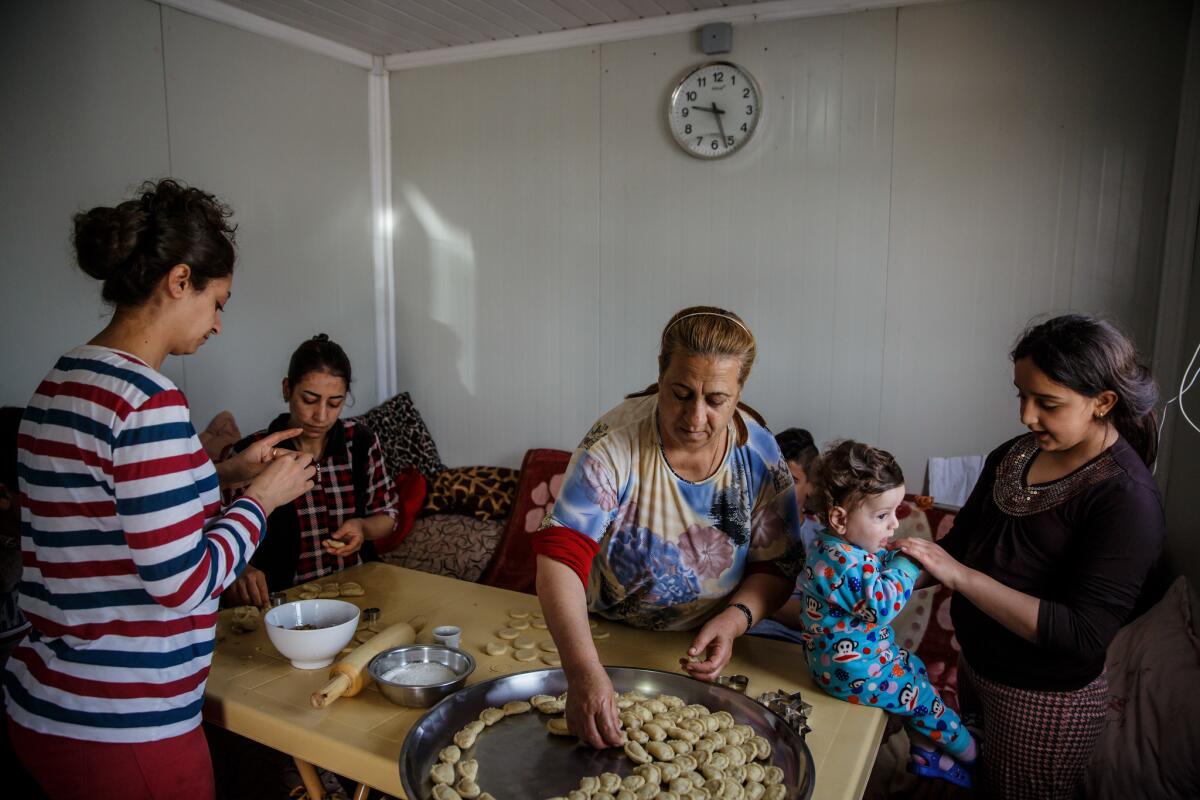
The three women chopped walnuts in the kitchenette of their two-room trailer, then poured them into a bowl along with dried coconut. Now, as children hovered, the bakers were rolling out and cutting sweet dough to make an Easter Iraqi favorite: klecha cookies.
Islamic State militants forced the trio of Assyrians from their Christian hometown of Qaraqosh two years ago. Suad Rahim and daughters Iman, 30, and Fata, 27, had expected to stay at the trailer park in the town of Irbil for a few months. But they can’t imagine returning home.
Most of the houses and storefronts sit empty. Militias police the area, and many citizens fear the armed groups have been infiltrated by Islamic State.
“In the night, it’s very scary,” said Rahim, 50. “We don’t know who is who.”
So her family of eight are still sharing a trailer, hoping to move to a house elsewhere in the Kurdish region of Iraq, or overseas. Many of their former neighbors are now in Australia, Canada and Britain. They don’t feel safe in Qaraqosh.
“If they try to push us back there, we’re going to Europe,” Rahim said of Kurdish officials. “It’s not getting better, it’s getting worse. Nobody is going back.”
Near Bethlehem: ‘We are a witness to the Lord in this city’
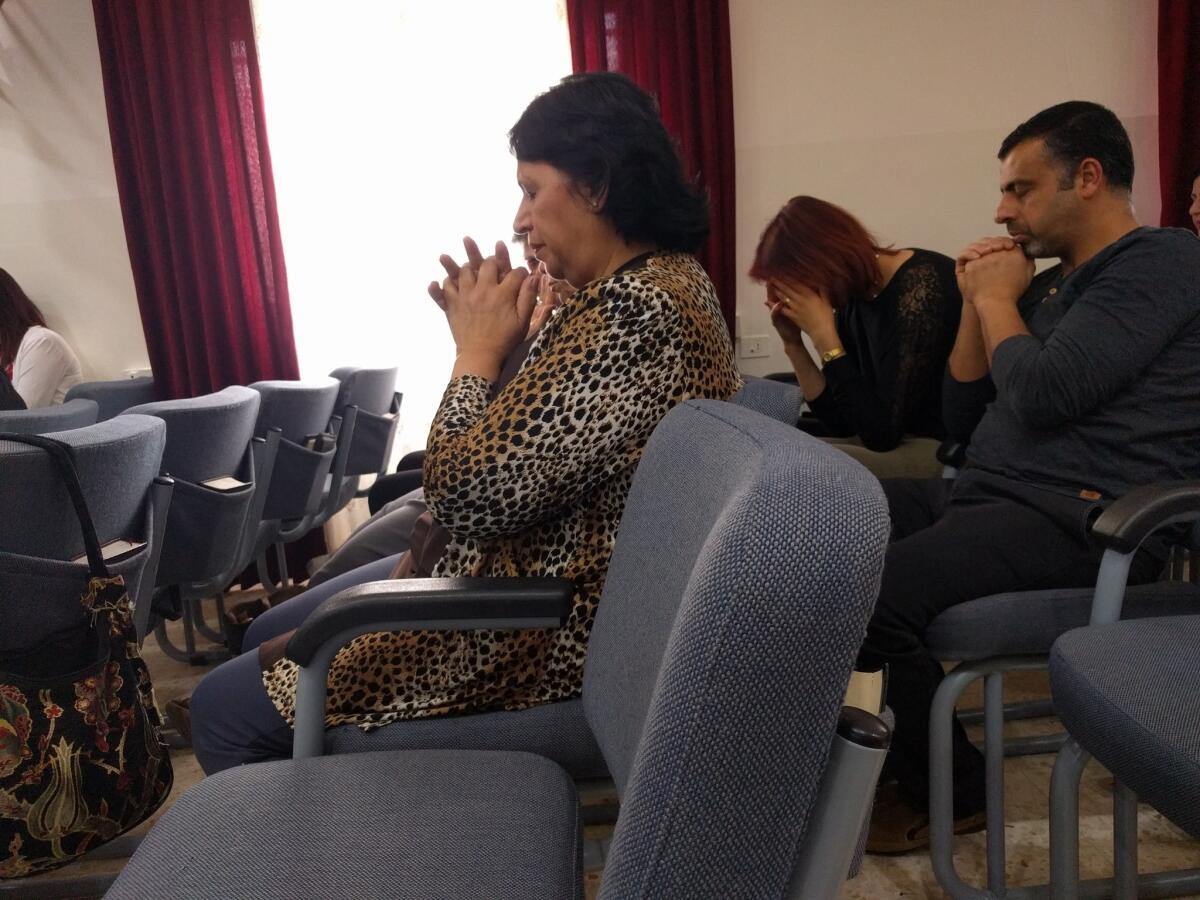
Buses rumbled past Rafat Houary’s stone villa ferrying a stream of tourists to the Shepherds Field Chapel, where Catholic tradition holds the birth of Jesus was first announced.
Standing on his balcony, the 43-year-old carpenter and fledgling craft beer brew master pointed out the hotels and restaurants on the horizon that had popped up around the holy site in the last few years as tourism to Bethlehem has picked up. Not long ago, the street was a war zone.
At the height of the Palestinian uprising at the beginning of the 2000s, the road became a battlefield for the Israeli army and Palestinian militants. Israeli tanks patrolled to enforce a curfew as the military scoured the town for gunmen and potential bombers. Many Christians from Bethlehem and the suburban villages of Beit Sahour and Beit Jalla moved abroad.
“I know 100 families that moved,’’ said Houary. “They were looking for a better life. They were looking for freedom. Maybe if I had a family and children at the time, I would have thought about moving.’’
But Houary stayed and helped build a new Bethlehem congregation. When he bows his head in prayer at the Immanuel Evangelical Church in Beit Sahour, he faces a colonnade-adorned altar that he erected.
Israel built fences behind his house separating him from his family-owned property. Fellow congregants fret about Islamic militancy spreading to the West Bank. But Houary remains optimistic. Christians, though a diminished minority in the Holy Land, still have a mission to fulfill, he said.
“We are a witness to the Lord in this city. So, we have to be here,” he said. “If all of us move, the culture will die. We want to find a light for them. We want to find a reason for them to stay in this country.”
Praying for terrorists in Cairo
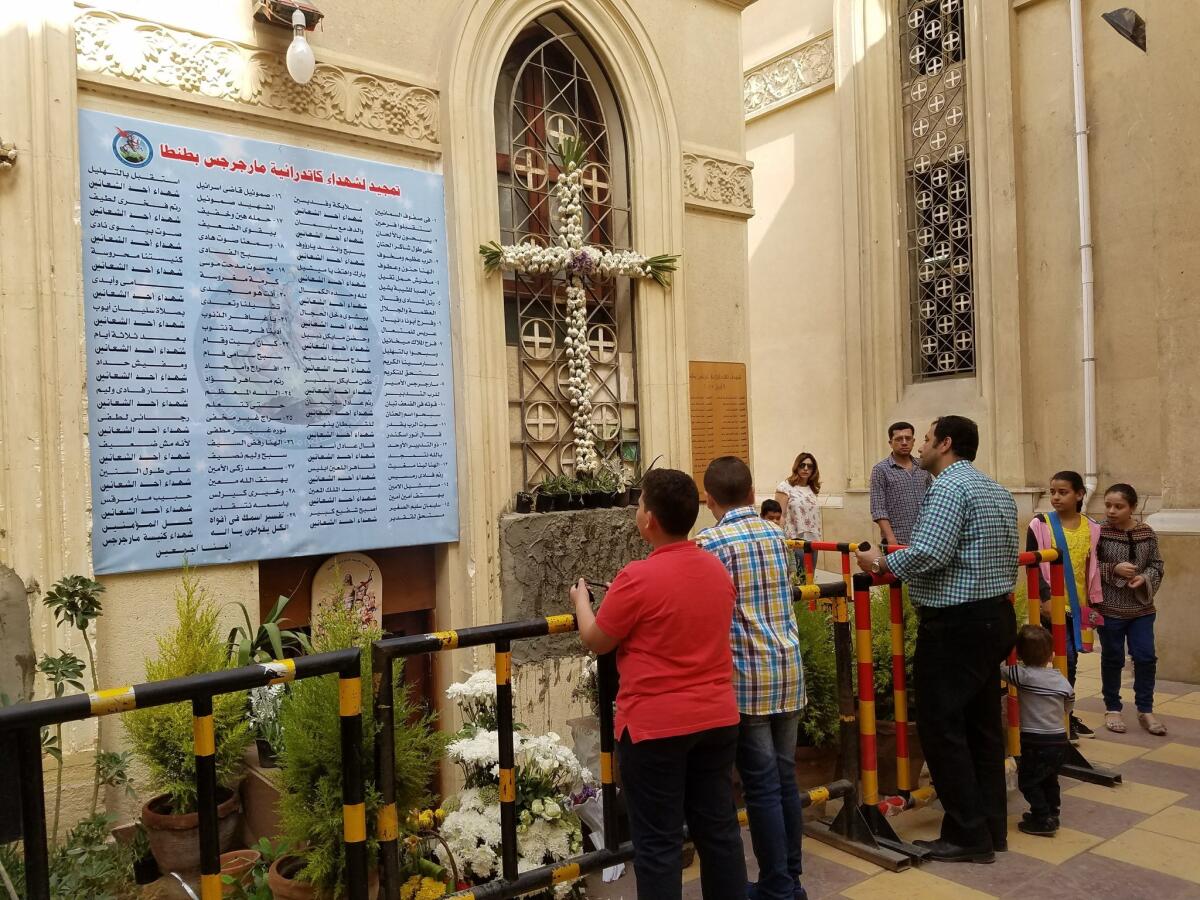
Vivian Aziz Shehata Shenoudah always covers her head when she goes out in Cairo. She calls it her “precaution.” The Coptic woman said she has been harassed by men, women, even children on the street for being Christian, for her gold crosses, dyed blond hair and makeup.
She has not seen her brother in San Diego in a decade. He no longer feels safe visiting her. Shenoudah’s apartment is in the Abbasia neighborhood, steps from her church, St. Mark’s. A suicide bomber attacked in December, killing 30 worshipers.
Despite the risks, for 42 years the unemployed widow has attended services every week. Last Sunday after church, she walked through the compound, pointing out her haunts: On Tuesday, she prays in the St. Athanasius (of Alexandria) chapel next to the tombs of two Coptic priests; on Thursday, in the St. Rueiss chapel, with its 12th century crypt; on Friday, the chapel of the Madonna and St. Rueiss (he’s a popular Egyptian saint, appearing with a camel).
On Sunday, the chapels were packed not just with Egyptians, but also with Christian refugees from Ethiopia, Somalia and Sudan.
Three days a week, Shenoudah also attends services at Botroseya Chapel, in the women’s area where the bomb detonated and marble columns are still pitted from the explosion. In a nearby hall, tour guides display remnants of the attack now considered relics and preserved under glass: bloodied pews, victims’ bloodstained heels, handbags and hair clippings.
Shenoudah comes to pray, but also for companionship. After her husband died, the Egyptian economy tanked and her consulting business assisting foreigners dried up.
She blames poverty and wealthy Gulf countries for stoking Muslim extremism.
“I always pray that they change their minds to peace and that they leave us alone,” she said.
‘This is the grave of the martyrs’
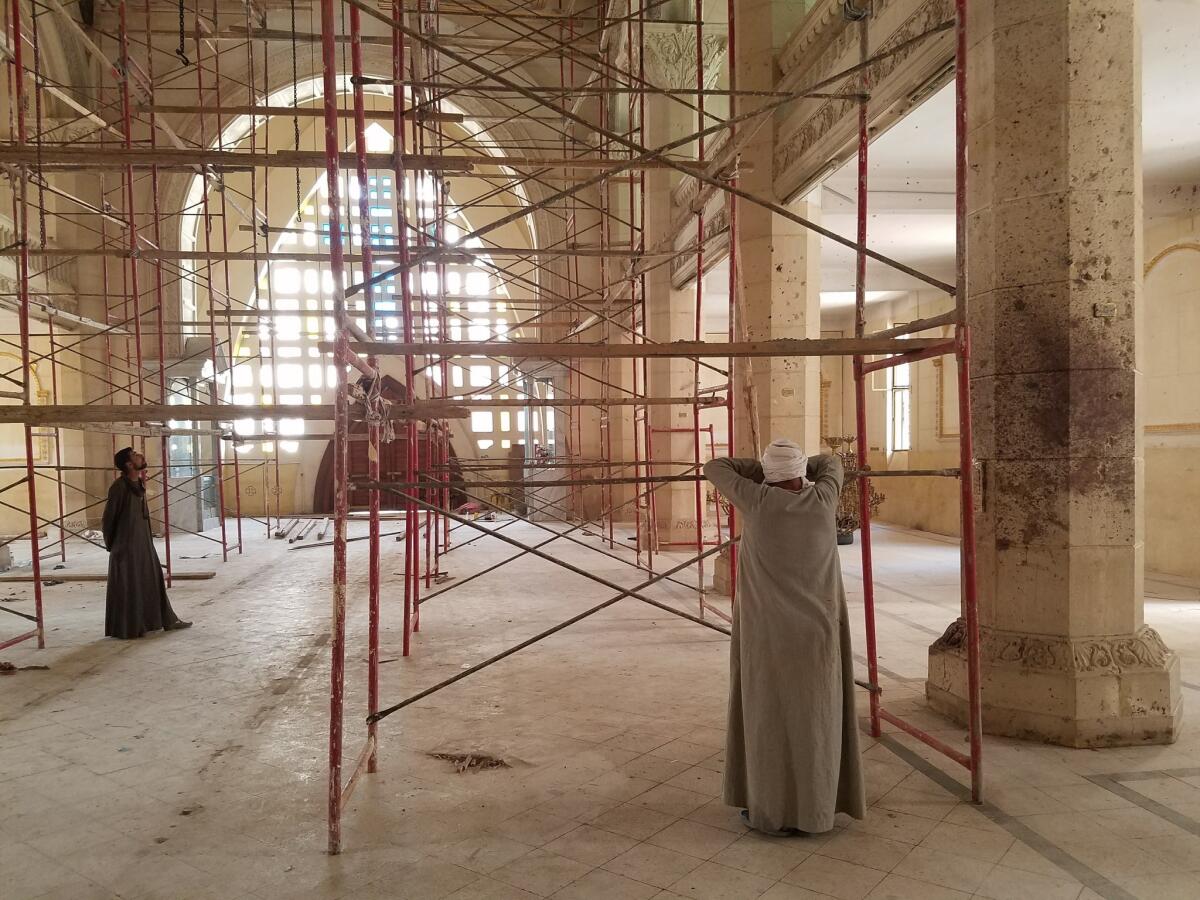
The bombing on Palm Sunday shook the Church of St. George in Tanta, Egypt.
“This is the grave of the martyrs,” says the sign next to the church where 28 who came to worship on Palm Sunday were killed by an Islamic State suicide bomber. They had their funerals there the same night.
Solemn families paused to pay their respects as they filed past on their way to services in the chapel just beyond. St. George, about an hour’s drive north of Cairo, is still gutted. Broken pews are heaped outside. Shattered windows reveal interior columns still pitted and bloodstained.
Many worshipers still wear black, out of respect for friends and family who were killed. The victims’ names are listed on a golden plaque some touch as they pass, hoping for a blessing. There’s a poem, too, and a picture of St. George, the “great martyr,” slaying a dragon.
Mina Magdi, 12, was at church the day of the bombing, along with friend Yousef Mina, 11.
Pellets from the bomb nearly struck Yousef’s mother. She survived. Her cousin was struck in the head by a piece of metal, Mina said. Attached to it was someone’s eye.
“I saw bodies split in two,” Yousef said as he stood before a grave.
The list of the dead includes their Sunday school teacher, the priest’s son.
Other children begged their parents not to come to church, afraid of another attack. But the boys were upbeat, despite the bloodshed they had seen here. They said they were not scared.
Lebanon an oasis of peace for Christians
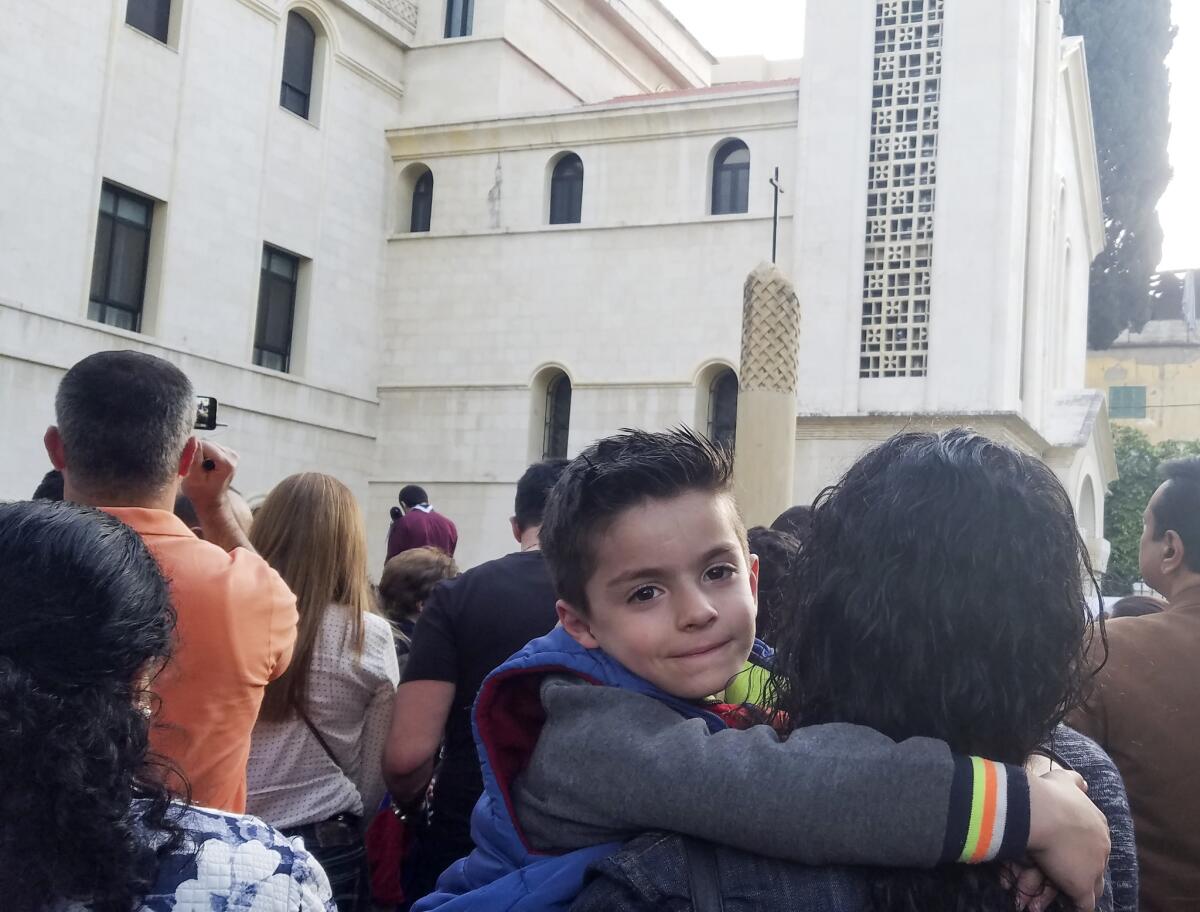
On the Saturday before Easter, residents of Beirut’s Mar Mikhael neighborhood enjoying an evening drink began to shout over the surrounding noise.
But it wasn’t because of the music piping out of the neighborhood’s cafes and bars. Instead it was the cacophony of hundreds of fireworks mixed with the peals of the many churches in the area. “It’s almost like they were competing over which one is the loudest,” complained one reveler when quiet finally returned.
It was yet another sign, several Lebanese Christian leaders said, that when it comes to their communities, Lebanon is the exception in the Middle East.
“There,” said Sebouh Garabedian, the laid-back media representative of the Armenian Catholic church, “you have explosions, and then they blew up the church in Egypt, so there is more fear.”
The “there” he referred to was neighboring Syria, where the six-year
A 33-year-old priest with stylish stubble and designer glasses, Garabedian was preparing last week for a large Mass set to be held in the large asphalt playground of a nearby school.
“Here it is the opposite. The churches are even fuller than in past years … because it is safe, and there is no fear regarding this sort of attack.”
Raffi Aywazian, a 25-year old Syrian Lebanese man, agreed.
Aywazian recalled his time in the northern Syrian city of Aleppo. In the years before the war, Aywazian said, the city’s sizable Christian community would have large street celebrations.
“It was even bigger than here,” said Aywazian with a note of wistfulness. He had come to Lebanon with his family five years ago, after the Syrian civil war finally reached Aleppo.
Many minorities in Syria fear the opposition, which is fighting to dislodge President Bashar Assad and is overwhelmingly Sunni Muslim. They point to the dominance of Islamist groups within its ranks.
In Beirut, however, Aywazian was happy to take part in the festivities all over Mar Mikhael.
Archpriest Mesrob Kerkezian credited the reason for Lebanon’s relative tranquility to its eighteen sects. The country’s politicians constantly jockey for benefits for their communities — none really ever gaining the upper hand.
In Iran, Armenian Christians commemorate the Turkish genocide
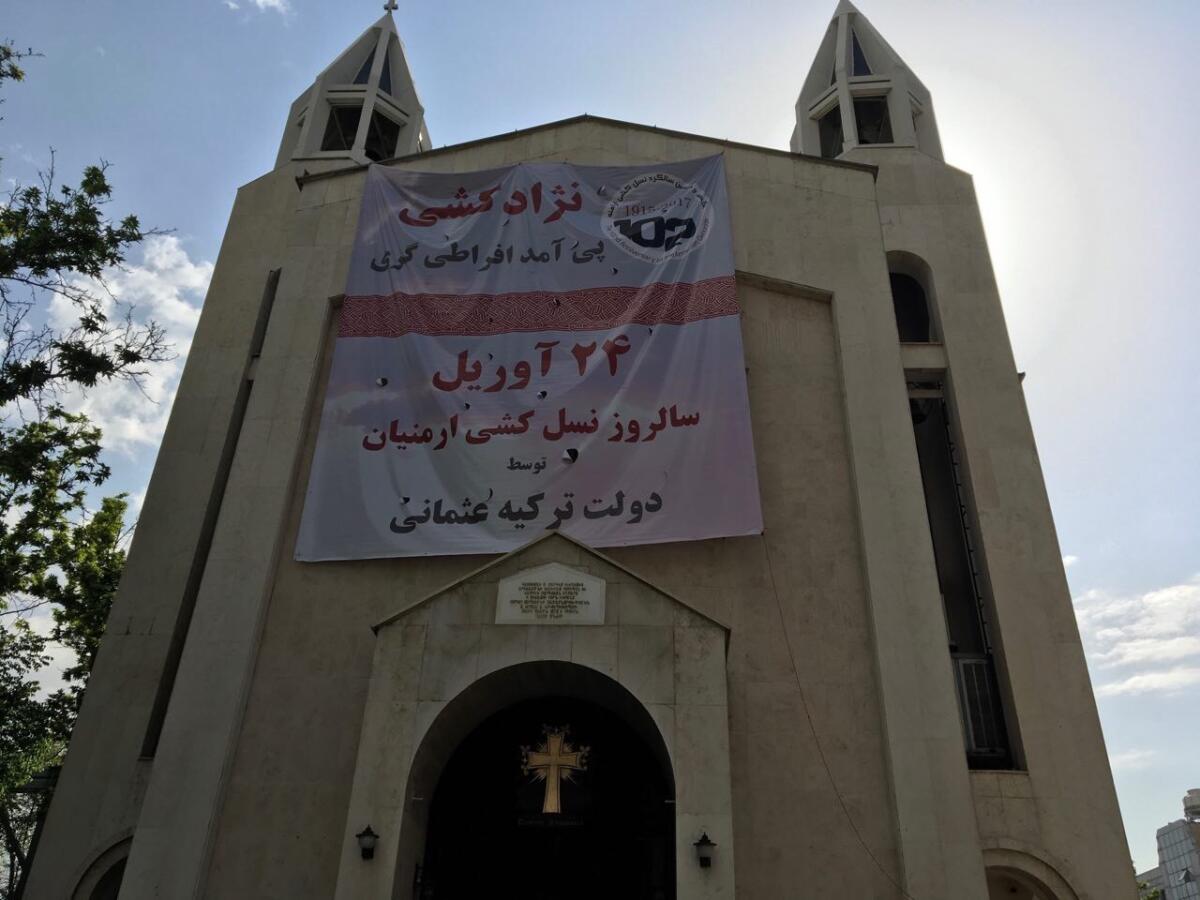
A sign spanning St. Sarkis Armenian Church in Tehran this week commemorated genocide of the Armenian people by the “Ottoman Turkish state.”
At a nearby grocery store, owner Gregory Davoud Daavetian, an Armenian Christian, said he looked forward to the pope’s visit to the Middle East.
The Armenian community in Iran is one of the oldest and largest in the world, and it enjoys official recognition in the Islamic Republic. There has been a surge in emigration in recent years, but much of it is due less to discrimination than a search for better economic opportunities.
The Iranian government places strict limits on proselytizing among evangelical Christians. But the Armenians are generally free to practice their religion.
“Any attempt to reduce violence in the region is appreciated,” Daavetiansaid. “I was born in Iran, I am Iranian Christian and Iran is my country.”
Hennessy-Fiske reported from Cairo and Mosul, Bulos from Beirut, Mostaghim from Tehran, Mitnick from the West Bank.
Sign up for Essential California
The most important California stories and recommendations in your inbox every morning.
You may occasionally receive promotional content from the Los Angeles Times.








